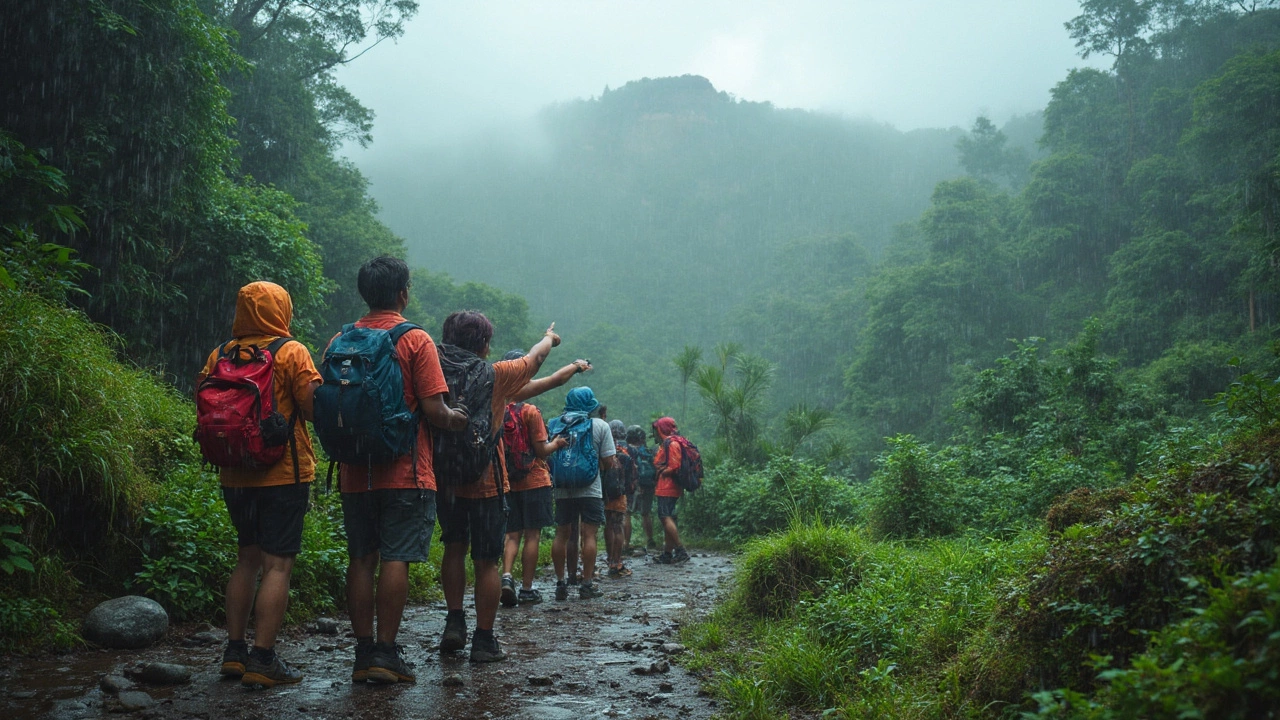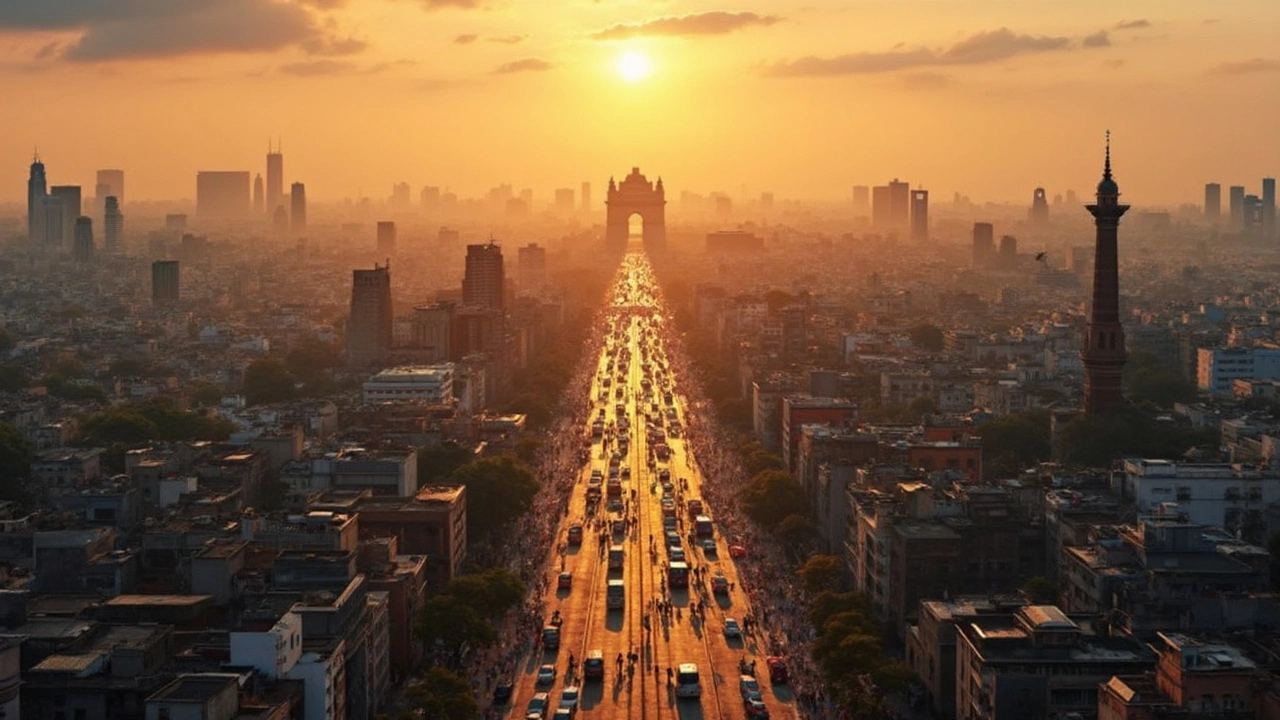Mumbai isn’t just a giant city on the west coast of India. People all over the world call it by different names—like the City of Dreams, the Maximum City, or just Bombay if you’re feeling old school. But ask a trekker, and chances are they’ll tell you Mumbai is the gateway to some crazy good treks you’d never expect in a city packed with traffic and tall buildings.
Anyone who’s spent time in Mumbai knows how the city buzzes nonstop. But here’s something a lot of people miss: in less than two hours, you can swap that noisy backdrop for green hills, misty forests, and old fort trails. Some of these treks aren’t far from where people take selfies on Marine Drive. Seriously, you can finish a morning coffee and still hit the base of a popular trail before noon.
- Nicknames that Stick: Mumbai’s Many Faces
- Why Trekking Near Mumbai is a Hidden Gem
- Must-Visit Trekking Spots Close to the City
- Tips for Trekking Around Mumbai
Nicknames that Stick: Mumbai’s Many Faces
If you ask ten people what Mumbai is known for, you might get ten different answers. The most famous nickname is definitely the City of Dreams. It comes from the millions who flood the city every year, all hoping to chase success, mostly in Bollywood or business. No surprise—this city’s film industry pumps out nearly 1500 movies every year.
Mumbai is also called the Maximum City. That’s not just about the size or the population (about 20 million and counting), but the energy. The city keeps going, day and night, and people learn to make the most out of very little: space, time, or money. The phrase was made popular by author Suketu Mehta who wrote, "Mumbai is the city where people come to make their fortunes, not their homes."
Mumbai is not a city, it’s a way of life.
– Times of India, 2019
If you’re into history, you’ll sometimes still hear “Bombay,” which is what the Portuguese and British called it for centuries. In 1995, the name officially switched to Mumbai, but you’ll spot old-time locals, old street signs, and a busy section of the city still using Bombay, especially in South Mumbai.
The city is also known as the Gateway of India—not just because of the famous arch, but because it’s the jumping-off point for so many journeys, festivals, careers, and yes, trekking Mumbai adventures.
Mumbai’s got a bunch of faces and wears many hats: financial capital, film city, food paradise, and the Mumbai nicknames reveal just how many sides this wild city has. Each nickname highlights a different vibe, so whether you’re here for movies, markets, or mountain trails, there’s a Mumbai that fits.
Why Trekking Near Mumbai is a Hidden Gem
Mumbai gets a lot of press for its nightlife, celebrities, and street food, but not many realize it’s also surrounded by incredible treks. The hills and forests just outside the city hold forts that are hundreds of years old, quiet lakes, and trails that are perfect for quick weekend getaways.
The best part? All these spots are easily reached by local train or a short drive. This is a huge deal in a city where everything can feel far away because of traffic. So if you’re itching for outdoor action, you don’t need a week off work. You can squeeze in a Mumbai trekking experience and still make it back for dinner.
Monsoon season changes everything. Hikes like Karnala, Rajmachi, and Peb Fort explode with green, waterfalls pop up, and mist hangs over the trails. Locals know this is the best time to go, but be ready to get super muddy. Treks range from easy (good for newbies) to tough climbs perfect for experienced trekkers. There’s something for everyone here, and you don’t need fancy gear—just comfy shoes and a raincoat if it’s July or August.
Fun fact: In 2023, the Maharashtra Tourism Department reported a 35% jump in weekend trekkers compared to pre-pandemic numbers. It’s not surprising, considering how much city folks need a break.
| Popular Treks Near Mumbai | Distance from Mumbai (km) | Best Time to Visit |
|---|---|---|
| Karnala Fort | 47 | June - September |
| Rajmachi | 82 | June - October |
| Harishchandragad | 120 | All year |
| Sanjay Gandhi National Park | Within City | October - March |
If you’re always searching for "trekking Mumbai" or "best trekking places in Mumbai," you won’t run out of options. Next time the city feels too loud, head for the hills. You’ll honestly feel like you’re in a different world—just an hour away from your office or college campus.

Must-Visit Trekking Spots Close to the City
Most people think of Mumbai for movies and money, but if you’re chasing adventure, you’re in for a surprise. Around Mumbai, there are trails that are perfect for a quick weekend escape or even just a single day off work. Here’s where you’ll want to lace up your shoes and hit the path.
- Sanjay Gandhi National Park & Kanheri Caves: Right inside Mumbai city, this park covers over 100 square kilometers and hides ancient Kanheri Buddhist caves. Hike through forests, spot monkeys, birds, and maybe even a deer. The main Kanheri Trail is easy, so even beginners can handle it.
- Karnala Fort Trek: Just an hour from Mumbai, this trek takes you to a hill fort surrounded by a bird sanctuary. It’s not too tough and the views from the top are killer (you see the Mumbai coastline from here on a clear day). The bird sanctuary is a treat if you’re into spotting rare species, especially during monsoon.
- Vasai Fort Trail: Mix a bit of history with adventure walking through the ruins of an old Portuguese fort. The trek is more about scenery and old-world vibes than steep climbs. It’s a quick getaway full of photo ops and sea breezes.
- Rajmachi Fort Trek: This one is a classic. The trail can start from either Lonavala or Karjat and is especially beautiful during monsoon with green hills and waterfalls everywhere. It’s more of a medium-level hike, but you get massive fort ruins and insane valley views at the top.
- Korigad Trek: About a two-hour drive from Mumbai, this trek is known for its well-preserved fort walls and wide trails. It’s simple enough for most people, but the reward is 360-degree views and lakes on the top, plus a cool night trek option if you want something different.
If you want to compare some quick details side by side, here’s a handy table on distance and difficulty:
| Trek Spot | Distance from Mumbai (km) | Difficulty | Best Season |
|---|---|---|---|
| Sanjay Gandhi National Park | 0 (within city) | Easy | Year-round |
| Karnala Fort | 45 | Easy-Moderate | Monsoon/Winter |
| Vasai Fort | 55 | Easy | Winter/Spring |
| Rajmachi Fort | 95 | Moderate | Monsoon |
| Korigad | 105 | Easy | Monsoon/Winter |
Quick tip: Mumbai’s treks are most popular during monsoon season, around June to September. The hills turn neon green, water flows everywhere, and it feels like you’re in a different world just outside the City of Dreams. Bring rain jackets, carry water, and if you’re going with friends, set out early to skip the crowds. Trust me, even if you’re not a “trek person,” you’ll love the change of pace.
Tips for Trekking Around Mumbai
If you’re itching to try trekking near Mumbai, there are some real tricks of the trade to make your experience way smoother. Mumbai’s weather is wild—monsoon season (June–September) brings killer green views, but it also means super slippery rocks and tricky paths. Start early in the morning to dodge both the crowd and the afternoon sun. Trust me, no one likes climbing a fort when it’s 35°C at 1 PM.
Packing light is smart, but don’t forget the basics. You’ll need a solid pair of shoes—think extra grip, because those Sahyadri slopes get muddy fast. Toss in a cap, a poncho during the rains, and 2 liters of water. Snack like a pro—nuts, energy bars, and fruit are light, cheap, and won’t melt in your bag.
Most treks around Mumbai have zero mobile signal once you’re a few kilometers in. Download offline maps—you can use Google Maps or try apps like AllTrails. If you’re a first-timer, plenty of local trekking groups organize day trips with transport and guides. Not only do you get to meet other fans of trekking Mumbai, but pros know these trails like the back of their hand.
Here’s a quick glance at some common things trekkers check for:
| Item to Prepare | Why It Matters |
|---|---|
| Sturdy Shoes | Steep, rocky, or slippery terrain is the norm |
| Water | Mumbai heat + hills = serious thirst |
| Offline Maps | Mobile data vanishes halfway up the hill |
| Weather Check | Sudden rain storms are common |
Public transport actually works for a lot of these treks—local trains go everywhere. For places like Karnala or Rajmachi, just hop off at the nearest station and catch a rickshaw to the base. Saves you from paying big bucks for a cab. But if you’re heading out during a long weekend, book tickets ahead—those trains get packed with fellow adventure seekers and regular commuters alike.
And don’t forget to respect local rules. Littering can get you a fine, some treks are inside reserves with strict entry times, and a couple (like Harishchandragad) might even require registration if you’re going in a group. Quick tip: locals sometimes sell homemade lemon juice at village entry points—buy it, you’ll thank yourself later when you’re sweaty and tired. It’s a legit Mumbai trekking tradition.
